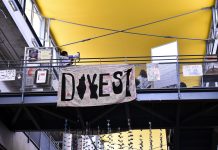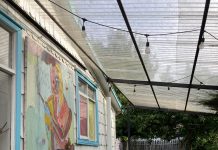Alondra Sierra
Isla Vista Beat Reporter
Students Against Sexual Assault (SASA), in partnership with the Isla Vista Community Services District (IVCSD), plan to establish a survivor resource center in Isla Vista by next fall that provides inclusive and accessible services to community members during weekends and nights.
An early discussion about the center was held during Tuesday’s IVCSD board meeting. This comes just two weeks after the IVCSD introduced a preliminary report on sexual assault cases, showing a significant number of reported rapes in Isla Vista.
The survivor resource center, introduced in the meeting by SASA co-founder and director Emily Montalvo-Telford and Lobby Corps co-chair Madeline Loudon, will provide services to all Isla Vista residents such as counseling, crisis intervention, and a 24-hour hotline.
Loudon emphasized that the center would not replicate local services in I.V., but rather provide more inclusive services geared towards the community.
Montalvo-Telford also expressed the need for services that survivors could easily access, describing long wait times for on-campus counseling centers like CARE and CAPS. Although CARE and CAPS do offer walk-ins, they only do so during regular business hours.
As a result, the resource center will be open regularly during off-hours, from 8:30 p.m. to 1 a.m. from Friday to Sunday, and 11 a.m. to 3 p.m. on Saturdays and Sundays.
Additionally, CARE provides services only to UCSB students and faculty, leaving out Santa Barbara City College students and other non-UCSB members who reside in I.V.
As a result, the center is planned to be an immediate, direct response for survivors. SASA proposed a staff of two service providers, a receptionist, and one student volunteer who would be properly trained through Standing Together to End Sexual Assault (STESA), formerly the Santa Barbara Rape Crisis Center.
The resources will focus on addressing specific sexual assault and sexual harassment issues in I.V. To understand how and where to direct their efforts, SASA recently released a sexual assault survey.
“We want the center to feel welcoming and accessible to everyone,” SASA said in an email statement to The Bottom Line. “We recognize that underrepresented communities such as the LGBTQ community and communities of color are often affected and targeted, and find it difficult to access these resources.”
Services directed towards Isla Vista’s Latinx community and family resources were also brought up during the meeting.
Alongside the IVCSD, SASA is working with STESA to extend services that they currently offer to I.V.
“STESA is about a 20 minute drive from Isla Vista and they’ve already had a history with really struggling to get people in this community to their center,” said Loudon, touching on why it would be beneficial to have a survivor resource center in I.V.
The timeline for the survivor resource center, however, currently depends on SASA’s ability to obtain sufficient funds. They hope to gain financial support from UCSB as part of the 12 demands that the university agreed on to reform sexual assault policies on campus.
“One of the demands was to create a crisis center so they’ve already agreed to it,” said Loudon. “So we’re just working on upholding the agreement.”
Though barely in the planning stages, SASA hopes to have an operating survivor resource center by fall 2018.









Please do not conflate CARE and CAPS waiting times. CAPS has weeks long waiting times, but CARE can accommodate people within a couple days, or provide immediate response when needed. CARE is open during office hours, but will provide immediate support 24/7 after business hours on their advocacy line, and in-person support when necessary. Another correction: CARE serves staff, as well as students and faculty.
STESA has Spanish speaking advocates available 24/7 on their hotline and in-person. In-person services include accompaniment to reporting, and helping transport clients to SART exams. Advocates will drive to you to help. It’s simply not true that in order to access services, clients need to go to STESA’s physical location, which is what Loudon implied. However, counseling services are only accessed at STESA’s location.
Make an appointment with CARE
– http://wgse.sa.ucsb.edu/care/how-we-help/make-an-appointment
– 24/7 advocacy line: 805-893-4613
– walk-in at SRB location
Make an appointment with STESA
– http://sbstesa.org/services/
– 24/7 hotline: 805-564-3696
Comments are closed.